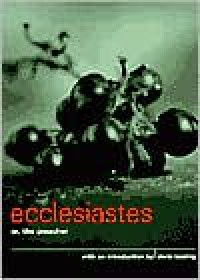4
Followers
9
Following
Clif's Book World
Adventures from reading books captured within short reviews.
Ecclesiastes: Or, the Preacher
 The Old Testament books (Hebrew Scriptures) are a collection of writings by numerous authors with a variety of opinions and points of view. Ecclesiastes appears to be the minority report that was included in the collection as token representation of those scribes who disliked rigid or dogmatic wisdom and absolute commands. I think of these scribes as being the left wing rabbis.
The Old Testament books (Hebrew Scriptures) are a collection of writings by numerous authors with a variety of opinions and points of view. Ecclesiastes appears to be the minority report that was included in the collection as token representation of those scribes who disliked rigid or dogmatic wisdom and absolute commands. I think of these scribes as being the left wing rabbis.Ecclesiastes is different in the way it instructs the reader. Much of the rest of the Biblical wisdom literature aims at setting up absolute opposites, (i.e. good versus bad, or God's pleased versus God's angry). Ecclesiastes questions such binary opposites and suggests that wisdom can be found in questioning established powers and values.
Because of these characteristics I believe that Ecclesiastes comes closer to being compatible with modern scientific reasoning and philosophy than any other book of the Bible. Ecclesiastes' study of human pleasure is empirical, testing each pleasurable experience and forming conclusion on the basis of those observations. The author writes about what he sees or finds in life, not what he thinks. He says:
“Behold, this have I found . . . counting one by one, to find out the account: Which yet my soul seeketh, but I find not . . .” (7:27,28).
Furthermore, I believe Ecclesiastes is a book with which a modern secular agnostic can feel compatible. True, Ecclesiastes may refer occasionally to God, but the writing doesn't seem all that certain that trust in God makes any difference for life on earth.
Some famous phrases and expressions from Ecclesiastes:
“Vanity of vanities . . . ! All is vanity” (1:2).
“all the deeds that are done under the sun” (1:14)
"The sun also ariseth" (1:5)
"[there's] nothing new under the sun" (1:9)
"he who increaseth knowledge, increaseth sorrow." (1:18)
“a time to keep silence, and a time to speak; A time to love, and a time to hate . . .” (3:7–8)
". . . the race is not to the swift, nor the battle to the strong . . ." (9:11)
“Send out your bread upon the waters . . .” (11:1)
"of making many books there is no end" (12:11)
"Remember now thy Creator in the days of thy youth" (12:1)


